The power of Christ compelled me... to write about this movie.
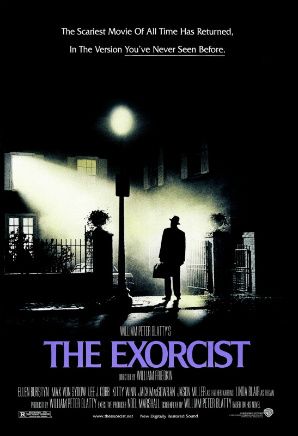
The Exorcist
1973
Director: William Friedkin
Starring: Ellen Burstyn, Max von Sydow, Linda Blair, Jason Miller
Last night, my husband and my sister accompanied me to a screening of The Exorcist. Neither of them had seen it before, and I hadn’t seen it in over 10 years, and even then, it was under less than ideal circumstances. Essentially, all three of us were seeing it for the first time, knowing little about it other than the classic sequences of Linda Blair’s head turning all the way around and the spewing of the pea soup. After the film ended, the three of us stood in the lobby and just looked at one another.
“Wow.”
“Yeah.”
“That was… um… intense.”
“Uh, YEAH.”
“Oh my god, that was so good.”
“TOTALLY.”
All right, so our critiques weren’t exactly eloquent, but The Exorcist had temporarily removed our ability to link thoughts with words. It’s that good a film.
The story is straightforward: Famous movie actress Chris MacNeill (Burstyn) loves her daughter, Regan (Blair), but when her behavior becomes increasingly erratic, she wonders what on earth could be wrong. After undergoing a series of frustrating medical tests, the doctors hesitatingly suggest demonic possession and point Chris in the direction of an experienced exorcist (von Sydow), who is assisted by a younger, slightly troubled priest (Miller).
What could be a schlocky horror film is elevated far, far above its simple potential through the strength of Friedkin’s direction. Hot off the heels of his success with 1971’s The French Connection, Friedkin was an exacting director not known for horror films, but instead for gritty realism, and so much the better. Rather than setting out to make a scary movie, he just wanted to make a movie - period. There is no “scary lighting” in this movie. There are no shots of a monster watching the heroine from a dark corner. Friedkin doesn’t treat the demonic possession portion of the film any differently than he does the character development and establishing shots. This gives the film a terrifying continuity; the camera stares, unflinchingly, at the prepubescent girl vomiting demon goo on a crucifix with the same cold eye with which it watched Chris shoot a silly little scene from a silly little movie earlier. Furthermore, because Friedkin doesn’t treat The Exorcist as a horror film, per se, the tension and suspense is crushing in its strength. With every scene, tension is ratcheted up, but there is rarely a pay off. As a viewer, that means that you keep on holding your breath, waiting for something to happen, only to keep on having to hold your breath through the next scene… and the next… and the next… only to exhale wildly in what can only be described as the frenzied exorcism scene.
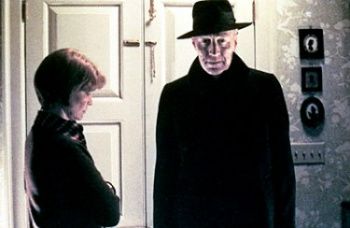
The tension was so acute at the screening last night that the entire audience (self included) jumped about six inches out of their seats in a scene where a phone rang in Father Karras’ room. A phone. Ringing. That was it. No monster, no demon. We were all so deeply invested, so tightly tied into the film, that the simple shot of a ringing telephone scared the crap out of an entire audience.
One of the scariest sequences in the entire film is found about halfway through, and has absolutely nothing to do with the exorcism. Desperately looking for a reason why her daughter is behaving so oddly, Regan undergoes medical tests looking for a brain lesion. The shots of Regan in the hospital are almost unwatchable, even by today’s significantly lowered standards. There are needles being poked into her neck followed by blood spurting out down her dressing gown, followed by loud and flashing machines flying around her head. Friedkin’s camera never flinches, clearly pointing out the horror of a situation like that. My husband, horror movie aficionado, had to actually look away in this scene, and the audience reacted audibly when the doctors told Chris that Regan would need another medical procedure, as if we were all saying at once, “Dear God No!” Impressive.
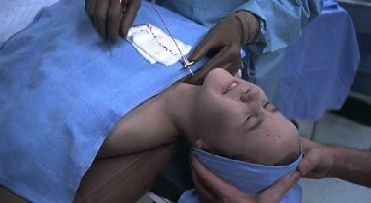
There is an extraordinary freshness to The Exorcist. It does not feel like a movie that is almost forty years old. Except for a couple fashions and the lack of twenty first century technology, it could easily pass for a movie released last year. While Friedkin’s tight direction is an enormous part of this, due must be paid to the actors as well. Linda Blair as poor, beleaguered Regan is extraordinary, carefully and deliberately taking us from sweet, chipper, precocious preteen to spawn of Hell. Ellen Burstyn is equally strong as her mother, not quite capable of wrapping her head around what is happening under her very roof. Jason Miller as Father Damien Karras, however, was my favorite performance of the film, despite the fact that Burstyn and Blair were nominated for Oscars and Miller was not. His Karras is a quiet character, yet deeply nuanced. A skeptical priest, a former boxer, a mamma’s boy, an Ivy League-educated psychiatrist, a deeply emotional and caring friend, a lover of beer and cigarettes - there is a lot going on with Damien Karras. He speaks with a working class accent, weeps openly, and stares wide-eyed at the horrors of demonic possession. Watching his story slowly begin to intersect with that of Chris and Regan is utterly beguiling.
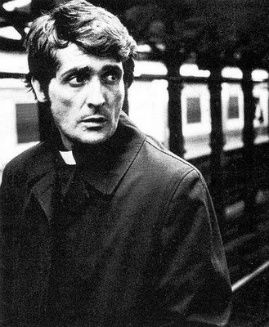
I found this still of Miller as Karras to be haunting and rather summative of his character.
There is a fascinating socioeconomic subtext to the film. Chris is a famous actress, and she lives like a famous actress. Her rented house in Georgetown is huge and she employs a staff of at least three (personal assistant, cook, butler). She doesn’t drive herself anywhere. She throws swanky parties in her house. Hers is a life of entitlement. Burstyn plays the character as a loving mother, but one who is certainly enjoying the luxuries of her class. As Regan’s possession takes hold, Chris’ sense of entitlement is significantly lessened, and we clearly feel sympathy for her as a mother concerned for her unwell child. However, after the film’s superb and crushingly powerful finale, after Regan’s demon has been exorcised, there is an odd sense of ingratitude on Chris’ part. It is as if she is saying, “Thank goodness that’s over, now I can get on with my life.” There is a distinct lack of appreciation on her part to those who delivered her daughter from harm’s way, one that is directly linked back to her social status. In light of the recent Occupy movements, The Exorcist can serve as a reminder that this sense of the upper class being better, deserving more, is, unfortunately, hardly new in the American psyche.
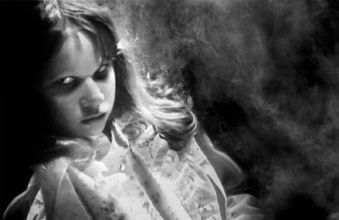
The power of The Exorcist to elicit shock and awe has, amazingly enough, not waned over the years. It’s dramatic power is strong and intact; I find myself thinking of it over and over again the next day. It refuses to leave my brain. Only the absolute best films implant themselves in my head that way, making it easy to see why it is one of only a handful of horror films to ever be nominated for Best Picture at the Oscars.
Arbitrary Rating: 10/10